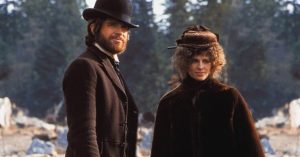
So much has been written in the past 50 years about McCabe and Mrs. Miller’s status as an anti-Western that its subversive take on the great American genre now seems like an afterthought. After all, Robert Altman’s restless sense of reinvention — his dismantling of the Western’s dusty romance, weathered machismo and propulsive action — is far easier to accept in the postmodern, genre-blurring 2020s than it was in 1971, when the film’s slippery oddness worked against it in the minds of too many critics. These days, it’s easy enough to put aside its generic (dis)placement and appreciate it for its lyrical parable of early-stage capitalism, and — notably for a director with a reputation for treating actresses less than charitably — for its staunchly feminist power dynamic.
If McCabe & Mrs. Miller, available in an essential 4K/Blu-ray double-disc set from Criterion ($26.82), sidesteps Western conventions, it fully embraces a narrative trope that’s as old as time: A stranger comes to town. The stranger in question is John McCabe (Warren Beatty), an imposing fellow in a cumbersome fur coat who rides into the desiccated environs of an unincorporated Pacific Northwest town in 1902. He gambles, he eats raw eggs, he’s a world-class belcher, and his reputation as a formidable gunslinger precedes him. As word spreads that he’s the same “Pudgy” McCabe who shot a man over a poker game years ago, he partially corrects the record. “I’m a businessman,” he says, not a gunfighter.
Hence his arrival in this inhospitable winter. He’s a man with capital to invest, and before long, McCabe has purchased three uncouth prostitutes from a nearby pimp and set up a makeshift tent brothel and gambling hall in the chaste-in-name-only frontier of Presbyterian Church, Washington. As McCabe’s fortunes increase, the town’s commercial appeal sparks the attention of Constance Miller (Julie Christie), an imperious Cockney madam with designs on McCabe’s burgeoning enterprise: She’ll run the whorehouse, and do it properly — with elegant ladies and proper hygienic standards — for 50 percent of his profits. She leaves him in a position where he’s all but incapable of saying no, and besides, he’s already hopelessly in love with her.
The extent of John McCabe’s evolution from dominant tycoon to one of Mrs. Miller’s emasculated johns is one of the delights of McCabe & Mrs. Miller, in part because a star like Beatty seldom had the opportunity to express such vulnerability. Mrs. Miller welcomes McCabe in her bed, but only if he pays like everyone else, and this drives a man who’s used to getting what he wants, on his terms, crazy. But then again, just about every scene in McCabe & Mrs. Miller is of a transactional nature.
From here on, what little plot there is to speak of consists of negotiations between McCabe and a pair of mining industrialists who wish to purchase his property. McCabe overplays his hand in the negotiations — not only is he hardly the feared gunman of myth, but his sharpness as a gambler is called into question as well — and briefly falls under the spell of a public advocate with a vendetta against the mining company. “We need take down these trusts and monopolies!” he insists to Mrs. McCabe, parroting a populism he doesn’t understand.
As the film ambles toward its climax, the forces lining up against McCabe and his pleasure palace catch up to him, and Altman finally allows some of the Western’s traditional gunplay to dictate the proceedings. But it’s the least interesting portion of this languid masterpiece, which is all about color and tone and interstitial observations: sex workers communing in a washroom; a hit of opium in the amber candlelight.
This is where the sublime Leonard Cohen soundtrack comes into play. Has contemporary music ever been so perfectly matched to a historic period piece? The folksinger’s haunted baritone instantly defines the picture’s mood, his lyrics functioning as a Greek chorus — a textural echo of the action, often coming and going, as in a musical. Cohen says everything McCabe can’t seem to vocalize to Mrs. Miller: “I’m just a station on your way; I know I’m not your lover.”
Criterion’s expectedly generous package includes boatloads of featurettes — including an hour-long making-of documentary with invaluable insights and humorous anecdotes from supporting-cast members Rene Auberjonois, Keith Carradine and Michael Murphy — and a 2002 audio commentary with Altman himself. My favorite bonus feature is an interview with Pauline Kael from a 1971 episode of The Dick Cavett Show, in which the host reads an excerpt from Kael’s evisceration of Tora! Tora! Tora! before bringing her on to praise McCabe. It’s remarkable, in 2024, to be reminded that there was a time when a film critic could not only be invited onto a major talk show but be received with rapturous attention and appreciation from the studio audience. Those were the days, indeed.
Finally, a postscript for the home viewer: Altman’s penchant for overlapping dialogue is at its most fragmented in McCabe & Mrs. Miller, and conversations often descend into inaudible babble. I believe this to be intentional, and baked into the movie’s singular, dreamlike recipe. Resist the crutch of turning on what are surely first-rate subtitles, and surrender to the mumble: You’ll feel you’re a part of the scene, not an outsider observing it.